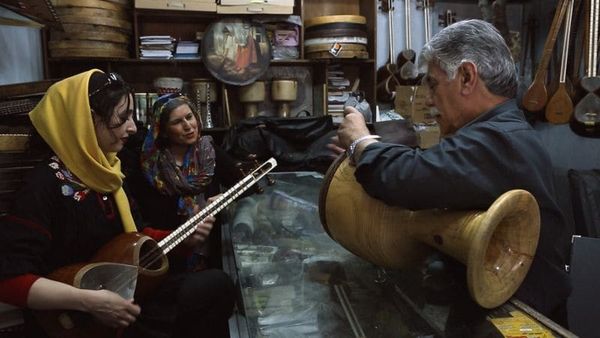Eye For Film >> Movies >> No Land's Song (2014) Film Review
No Land's Song
Reviewed by: Rebecca Naughten

Composer Sara Najafi wants to revive the female voice in Iran and resurrect the tradition of female soloists only heard now in black market recordings from the 1920s and 1950s - since the Islamic Revolution in 1979, women have been forbidden from singing as soloists in public. Sara begins applying for permission to stage a concert of female soloists performing traditional and specially-composed songs, but also expands her plans to include French female soloists so as to build a bridge between Iran and the West. Director Ayat Najafi (Sara's brother) follows Sara and the performers (singers and musicians) over the course of two-and-a-half years as she tries to get the Iranian authorities to agree.
The crux of the matter is that according to the religious scholar whom Sara consults in order to understand where the boundaries might be, the prohibition of the female solo voice in Islam is linked to the danger of male sexual arousal. The female voice must not be enjoyed - although apparently a chorus of women will effectively cancel each other out, one woman singing on her own is too enjoyable.

It is significant that No Land's Song in some ways mirrors that inclination for layering female voices by only presenting Sara's thoughts and opinions through conversation with others - there is no voiceover and she does not talk direct to camera. Although she clearly does not see the project as being about herself, this tendency in the film's construction keeps us at one remove from the passion that presumably must be driving her in the face of continual frustrations and obstructions.
Without religious support for her intentions, Sara only has her own determination to use in negotiations with the authorities, and her dealings with the Ministry of Culture and Islamic Guidance's Department of Music have a surreal edge. Unable to film the meetings, she wears a dictaphone under her hijab and the audio plays over a black screen in the film - the tones of voice sound friendly but often carry an implicit threat in their evasiveness and condescension. Her secret recordings seem risky given the political climate in Iran, but the question of what is personally at stake for her by persistently pushing back (bluntly so, later in the film) against official resistance is not addressed. Each time Sara complies with a new requirement - for example, the only way they will allow female singers to perform in front of a mixed-sex audience is if a male soloist is included and the women are listed as backing singers - the authorities adjust the parameters again. The inclusion of the French singers causes considerable problems.
Over the two years the French singers and musicians remain committed to the project, if somewhat aghast at - and resistant to - the restrictions to be placed on their performance style (women are to stay seated and cannot dance while singing, the men must restrict their bodily movement) if they are given permission to perform in Tehran. Arguably for all their 'understanding', the French don't really 'get' the situation until much later in the process when they receive a crash course in how their Iranian counterparts live with the changing whims of the authorities on a daily basis - and realise that Sara will be held accountable if things go wrong.
But the Iranian women know what they are getting into - and what they want to achieve - from the start. Sara's former schoolfriend Sayeh Sodeyfi works as a singing instructor but is not officially allowed to sing in front of male students - she is supposed to teach them the technicalities without demonstrating. As she says, it is her self-expression that is being curtailed - "No instrument can convey emotion like a voice can" and not being able to sing "is like the colour red ceased to exist and you could no longer paint".
The process of getting permission for the concert is long and frustrating for all of those involved, although the tension in relation to whether or not it goes ahead is undercut by Najafi using Sara's concert introduction as the film's opening scene (before flashing back to the previous two years). For all of the moment of triumph - and the sound of these beautiful voices being heard in Tehran once more - the feeling as the film draws to a close is that Iran's vibrant women are still being kept out of sight (and out of earshot) by a regime and society set on restricting female autonomy.
Reviewed on: 12 Mar 2015














